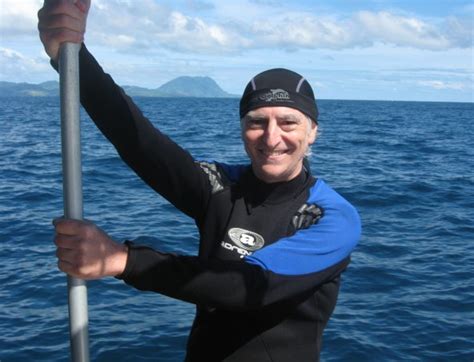A Quote by David Helvarg
We tend to think of America's days of frontier exploration as being behind us, but that's because we tend not to think of the other 71% of our blue planet.
Related Quotes
I tend to think that we are all pretty much alike. We all feel despair. We all have problems with relationships. We all become afraid. We all look at others and think these other people are more fortunate than us. Certainly the details of our life are unique. Spending time thinking of how I am different from someone else, however, does not tend to be very productive.
I don't think a lot of people in America understand what Indians are. And that's our fault, a little. We tend to forget our roots a bit. As kids we think, If I'm too Indian, I'll be put in a box, and people will think of me as different. They'll think I'm weird, because I eat Indian food or my name is difficult to pronounce.
America is not going to side with the people that think our best days are behind us. It's not going to side with the people that think we pit people against each other, even if they believe at their core - which I think some of these people do - that, you know, ultimately Trump would make things better.
Our self-perception determines our behavior. If we think we’re small, limited, inadequate creatures, then we tend to behave that way, and the energy we radiate reflects those thoughts no matter what we do. If we think we’re magnificent creatures with an infinite abundance of love and power to give, then we tend to behave that way. Once again, the energy around us reflects our state of awareness.
I would like travelers, especially American travelers, to travel in a way that broadens their perspective, because I think Americans tend to be some of the most ethnocentric people on the planet. It's not just Americans, it's the big countries. It's the biggest countries that tend to be ethnocentric or ugly. There are ugly Russians, ugly Germans, ugly Japanese and ugly Americans. You don't find ugly Belgians or ugly Bulgarians, they're just too small to think the world is their norm.
I'm not one for sitting around listening to my own music, because I tend to cringe and think that I could have done better. I also suffer from red light syndrome quite a lot. I tend to narrow my thinking when the red light goes on to record. Instead of just relaxing and playing and emoting, I think of time being wasted so I won't take a chance on something. Consequently, when I hear it back, I think, "Why the hell did I play it so safe on that piece of music when I could have really opened up?" Well, it's because of not wanting to make a mistake.
































